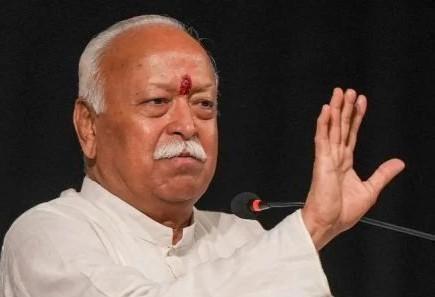
If Someone Turns to Evil, We’ll Teach Lesson: Bhagwat on J&K Attack
The recent terror attack in Pahalgam, Jammu and Kashmir, has sent shockwaves across the country, leaving many people shaken and appalled. In the aftermath of the incident, Rashtriya Swayamsevak Sangh (RSS) chief Mohan Bhagwat has weighed in on the situation, emphasizing the importance of non-violence as India’s religion. However, he also made it clear that the country will not hesitate to teach a lesson to those who engage in evil deeds.
In a statement that has sparked both praise and criticism, Bhagwat said, “We never harm or disrespect our neighbours, but if someone is bent on being evil, what is the cure? The king’s duty is to protect the people, and he will do his duty.” His comments have been met with both support and skepticism, with some hailing his stance as a necessary measure to combat terrorism, while others have criticized him for advocating violence.
Non-violence is indeed a fundamental aspect of Indian culture and philosophy, particularly in the context of Mahatma Gandhi’s concept of non-violent resistance. Gandhi’s philosophy has inspired movements for civil rights and freedom across the world, and his message of non-violence continues to resonate with people around the globe. However, the harsh reality of the situation in Jammu and Kashmir is that terrorism and violence have become all too common, and in such cases, the question arises: is it possible to respond to evil with only non-violence?
Bhagwat’s comments are not without precedent. In recent years, there have been several instances where the Indian government has taken strong action against terrorist organizations and their sympathizers. The surgical strikes carried out by the Indian Army in 2016, for example, were widely praised as a bold response to the Uri terror attack, which had claimed the lives of 19 soldiers.
Similarly, the recent airstrikes carried out by the Indian Air Force against terrorist camps in Pakistan have been hailed as a necessary measure to counter the threat of terrorism. In both cases, the government’s actions were seen as a strong response to the evil deeds perpetrated by terrorist organizations.
However, it is also important to recognize that violence, no matter how justified, can have unintended consequences and perpetuate a cycle of violence. As such, it is crucial that the government and other stakeholders work towards finding a peaceful and sustainable solution to the problems faced by the people of Jammu and Kashmir.
One possible approach could be to focus on addressing the root causes of terrorism, such as poverty, unemployment, and political marginalization. By addressing these issues, the government can help to create a more stable and peaceful environment, which can help to reduce the appeal of terrorist organizations.
Another important aspect is to promote dialogue and reconciliation between different communities and groups. In Jammu and Kashmir, the complex political landscape and historical grievances have created deep divisions between different communities, which can be exploited by terrorist organizations. By promoting dialogue and reconciliation, the government can help to build bridges between different communities and reduce the sense of alienation and marginalization that can drive people towards extremism.
In conclusion, while Bhagwat’s comments may have sparked controversy, they also highlight the complexity and nuance of the situation in Jammu and Kashmir. While non-violence is an essential aspect of Indian culture and philosophy, it is also important to recognize that the country must take strong action to counter the threat of terrorism. By addressing the root causes of terrorism and promoting dialogue and reconciliation, the government can help to create a more peaceful and stable environment, which can ultimately benefit the people of Jammu and Kashmir.
Source: https://youtu.be/SpAKVWl5wII



